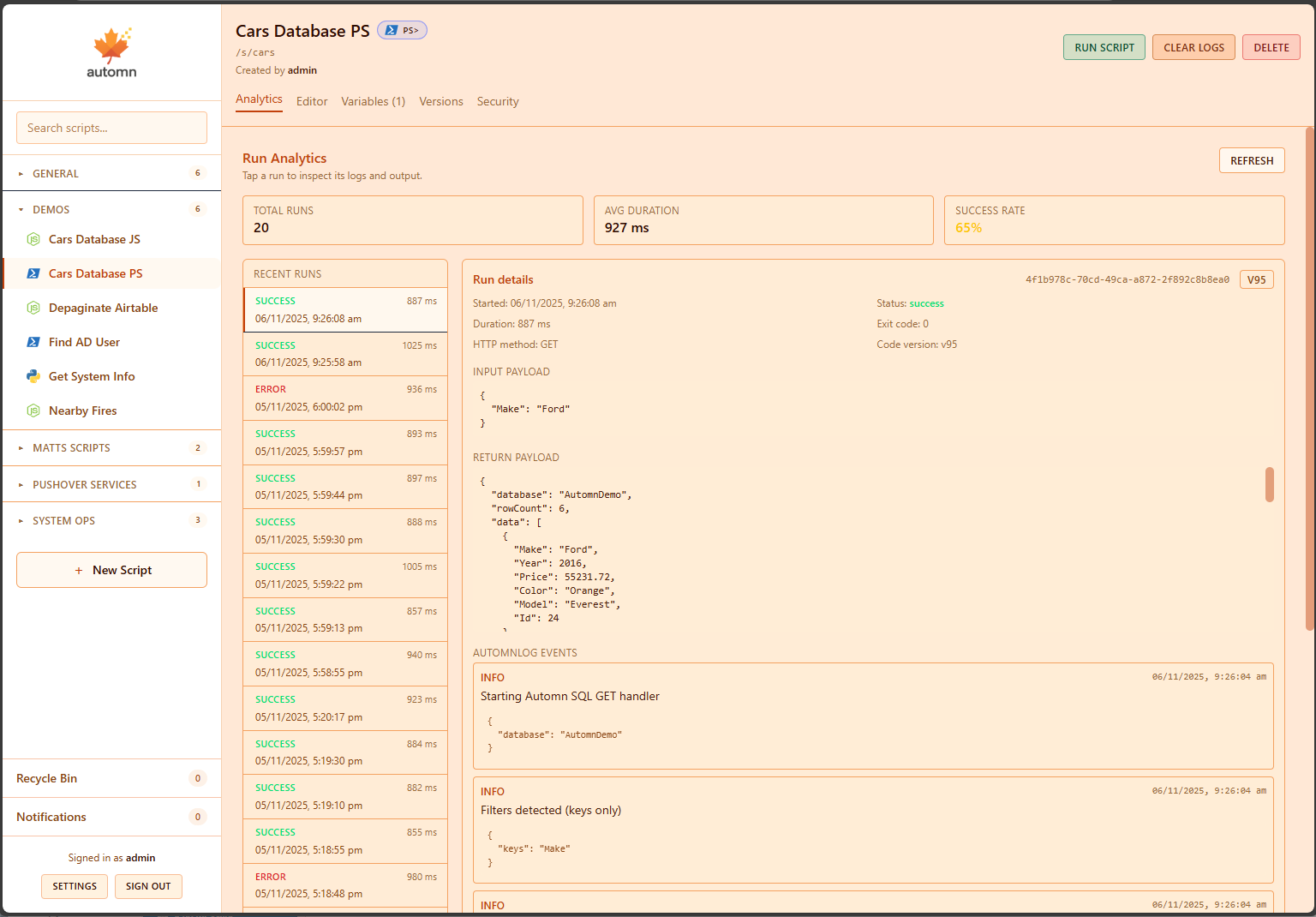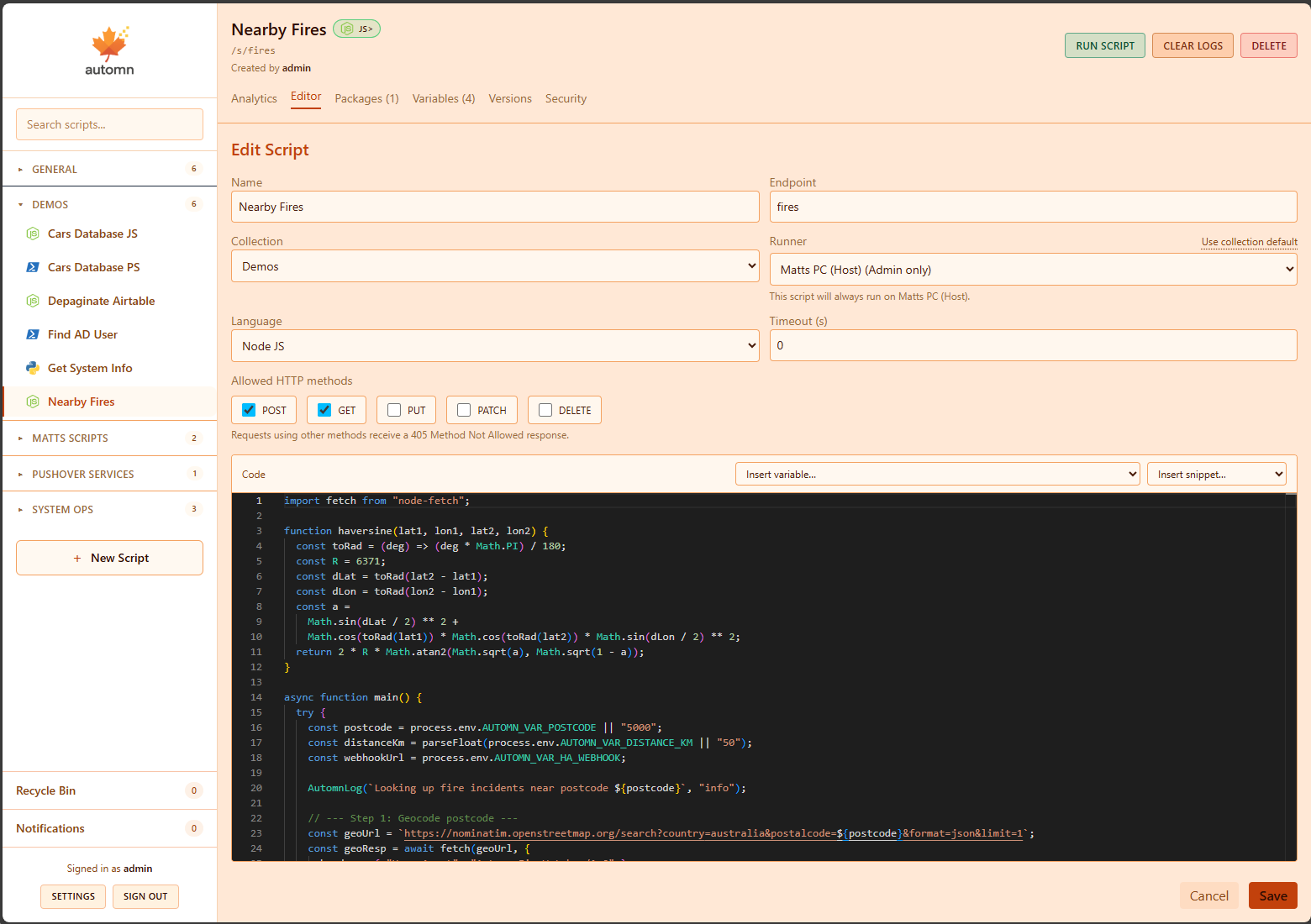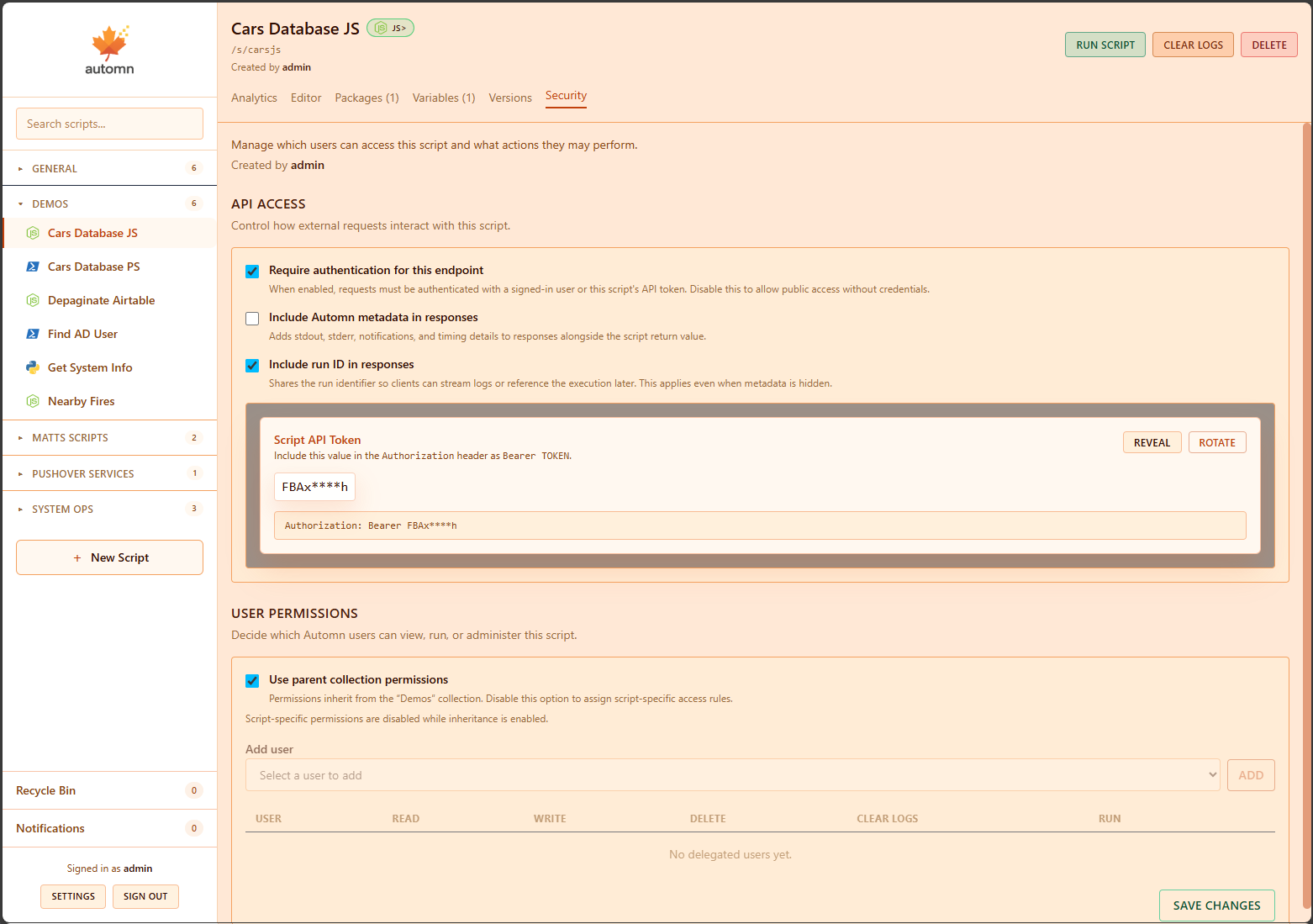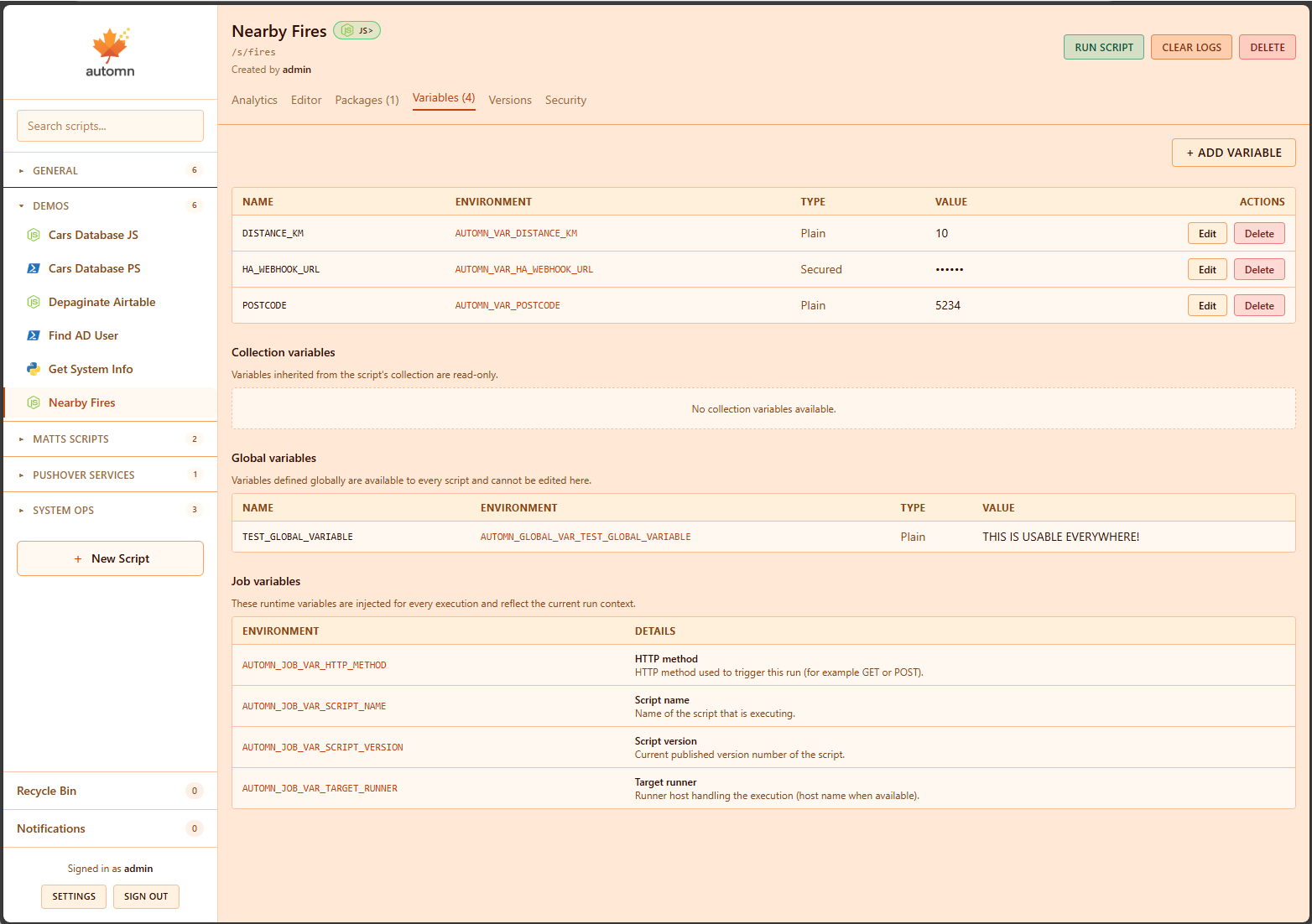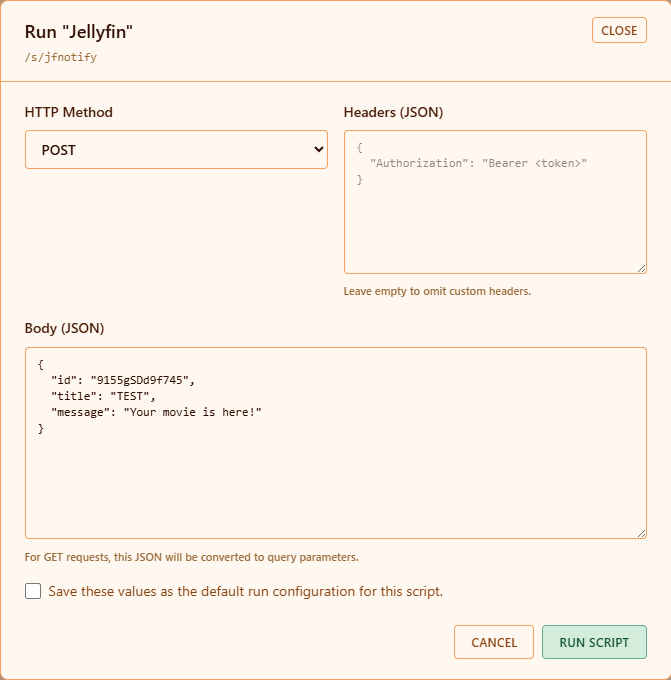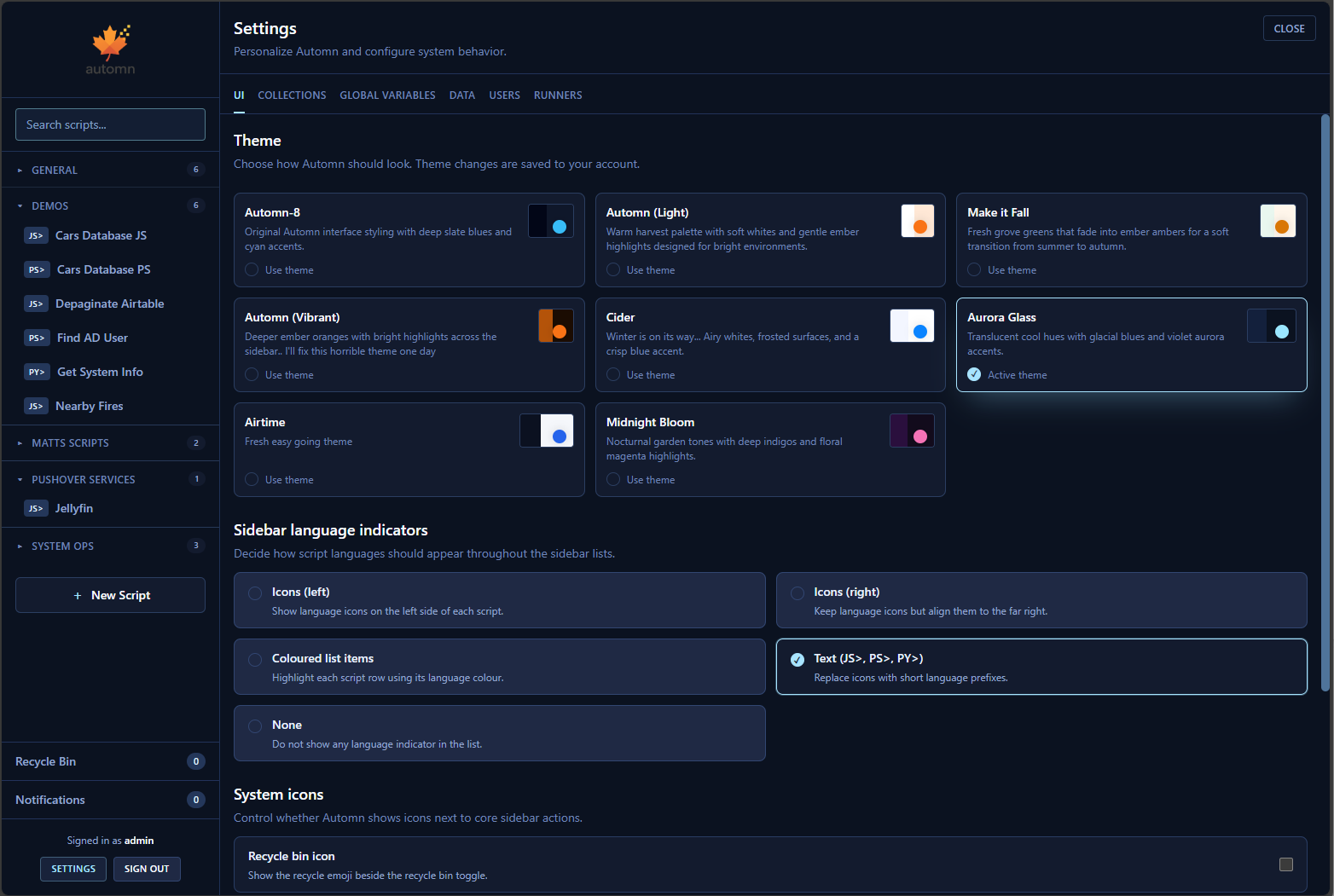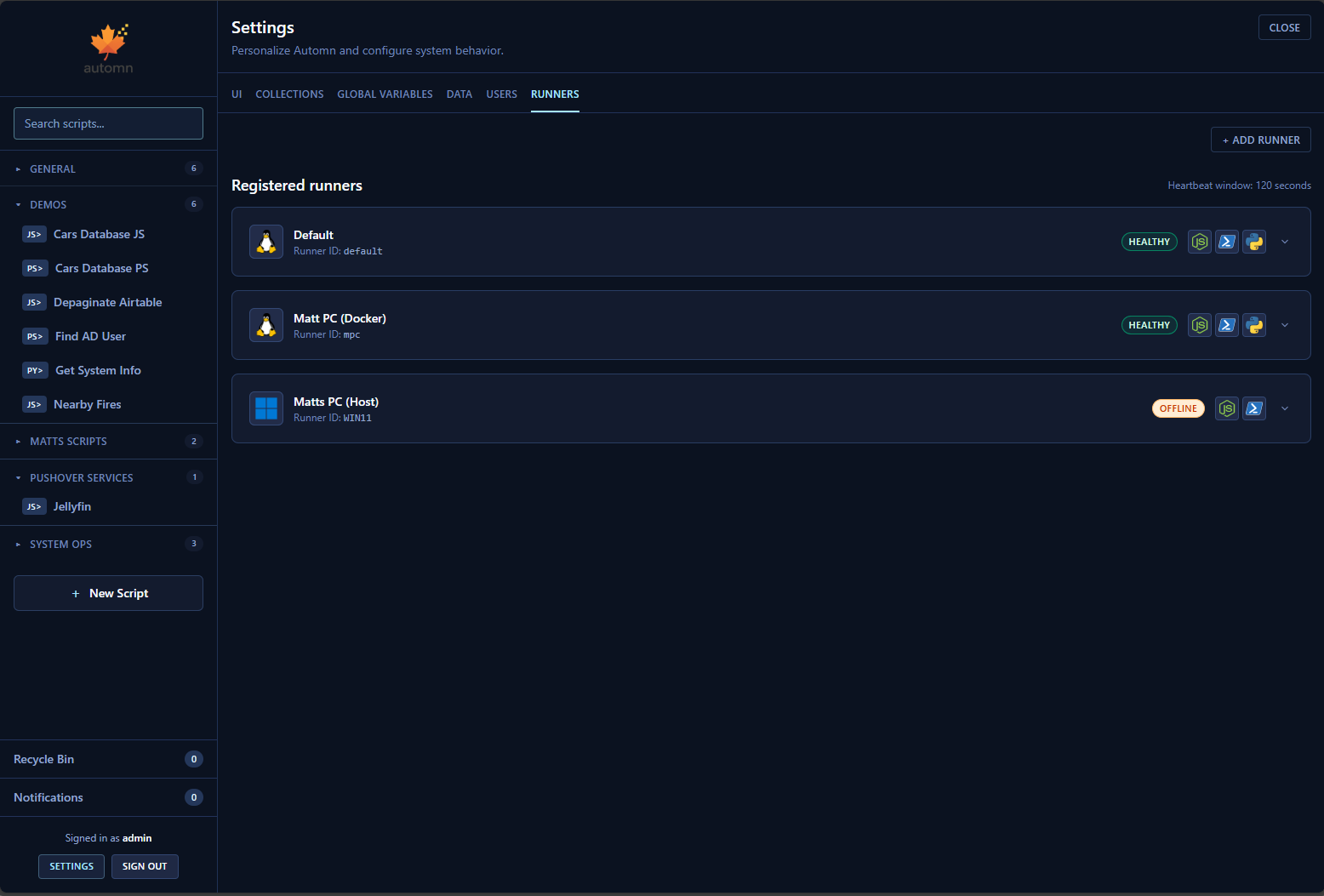Automn is a self-hosted automation control plane for authoring, scheduling, and auditing scripts across remote execution runners. The host exposes an Express API, a bundled React UI, and a job engine that keeps execution state, logs, and notifications in sync.
Currently, Automn is in a very early prototype phase, though feature rich and working well as a product for my needs.
Automn is seeded from similar projects I've created over the years, though this is the first attempt at decoupling the runner from the host with runner-to-host feedback. My previous projects were desktop based script runners designed to add a UI for running scripts easily with parameters, or just running scripts organized in a system tray context menu.
This project is best suited for hobbiest home labbers who want a way to quickly spin up script based APIs or webhooks.
Some examples I use it for:
- To receive webhooks from jellyfin when it adds a new TV show or Movie. It'll retrieve the items image from jellyfin and use it to send a pushover notification for a pro looking notification
- Replaces a NodeJS/Express project I was running on my home PC as a service where it could listen to commands such as /shutdown /sleep /mute etc. I used this mostly for a Siri integration, now I can much more easily update my scripts without having to rebuild my windows service every time - I just update the script in Automn!
- Trigger backup processes with some logging and notifications
- Start and stop by openVPN container via a command (so I could have a switch in home assistant).
I'd love to keep developing Automn and seeing how strong it can become.
- Centralised automation hub – manage script versions, environment variables, collections, permissions, and audit trails from the web UI.
- Remote runner orchestration – register runners with configurable concurrency/timeouts and stream live execution logs back to the host.
- Language-aware execution – built-in helpers for Node.js, Python, and PowerShell scripts with structured return, log, and notification primitives.
- Secure by default – encrypted variable storage, scrypt hashed credentials, signed session cookies, and shared-secret runner authentication.
- Docker-ready deployment – ship the host and runners together with persistent volumes and optional language runtime pins.
Logs all information about your script, scripts can include specific automn logging, see the data sent to the endpoint along with the data returned to the client.
Author your script, create a /endpoint so other systems can call your script, set the allowed HTTP methods Automn will accept for this endpoint. Easily insert variables and Automn Specific snippets into your code.
Add a layer of protection on these scripts, require authentication via opaque bearer token. Choose to send automn response data back to the client for more granular control, logging and automation possibilities. Also set which users have access to the app with some granular controls.
Variables can be created at the global, collection and script level. There are a number of fixed session/job level variables which can be used in your scripts also.
This also includes options for secured variables which can be used to store API keys, passwords etc. This data is unencrypted and added into the script when its sent to the runner, so care must be taken to ensure it won't appear in logs etc.
Test or run the script as you need through the Automn Host interface. Featured to allow you to post data, you can even save your test data for when you need it.
Forget the vibrant theme, dark themes are included.
Runners can be easily installed and connected to the host to provide a strategic locations to run your scripts. Some runners might need to be installed in specific network locations or on specific hardware to perform their task. Manage the runners and monitor their health from the Automn host interface.
In this example, the Automn host and Automn runner will run on the same docker host. Ensure the IP addresses match your dockers host IP.
If using this in production, it's highly advisable you put the host and runners behind a reverse proxy and apply an SSL certificate.
services:
automn-host:
image: automnexus/automn:latest
container_name: automn
ports:
- "8088:8088"
volumes:
- ./data:/app/data
- ./logs:/app/logs
environment:
- NODE_ENV=production
restart: unless-stopped
automn-runner:
image: automnexus/automn-runner:latest
container_name: automn-runner
ports:
- "3030:3030"
volumes:
- ./runner-state:/app/state
- ./runner-scripts:/app/scripts
- ./runner-workdir:/app/script_workdir
restart: unless-stopped
environment:
- NODE_ENV=production
- AUTOMN_RUNNER_ID=default
- AUTOMN_HOST_URL=http://<Automn Host IP>:8088
- AUTOMN_RUNNER_PUBLIC_URL=http://<Automn Runner IP>:3030- Browse to the host: http://:8088 and login with user: admin and password: scriptfall (You'll need to update the password)
- Go to SETTINGS, and in the UI tab turn off all system icons, maybe one day they'll be good enough that I'd not suggest this.
- While in settings, go to the RUNNERS tab and click + ADD RUNNER
- Give it any name you like, the Runner ID must match what you put in AUTOMN_RUNNER_ID in the docker compose (default is default) and leave the secret blank - Click CREATE RUNNER
- Copy the Runner secret
- Browse to the runner: http://:3030 and paste in the Runner secret you copied in the previous step
- For the docker build, you can leave the runtime executables section as is, just click Register runner
At this point you can test your runner. Head over and create the following test script:
| Field | Value |
|---|---|
| Name | test |
| Endpoint | test-endpoint |
| Collection | General |
| Runner | Select the runner you created above |
| Language | Node JS |
| Timeout (s) | 0 |
| Allowed HTTP methods | POST, GET |
Add the code:
AutomnLog("Testing if " + process.env.AUTOMN_JOB_VAR_TARGET_RUNNER + " will run " + process.env.AUTOMN_JOB_VAR_SCRIPT_NAME, "info");
AutomnReturn({ success: true, message: "That couldn't have gone any better!" });
- Select Run Script, leave it as is (POST is fine) and click RUN SCRIPT or browse to: http://:8088/s/test-endpoint to trigger the script
- Check the analytics tab, you should see a success posting with a return payload of:
{ "success": true, "message": "That couldn't have gone any better!" }
Have fun!!!
docker compose up --build -dThe compose stack builds the host and runner images locally, publishes the host UI/API on http://localhost:8088, and exposes the runner UI on http://localhost:3030. Named volumes persist database files, audit logs, runner state, and cached script artifacts between restarts.
Environment variables you should change before production:
| Variable | Service | Purpose |
|---|---|---|
AUTOMN_VARIABLE_KEY |
automn |
32-byte secret used to encrypt stored environment variables. Rotate and back up securely. |
AUTOMN_SECURE_COOKIES |
automn |
Set to true when Automn is served over HTTPS to mark auth cookies as Secure. Defaults to false for HTTP setups. |
AUTOMN_RUNNER_ID |
automn_runner |
Identifier generated when you create a runner in the host UI. |
AUTOMN_RUNNER_PUBLIC_URL |
automn_runner |
URL the host uses to reach the runner. Update if you expose the runner outside the compose network. |
AUTOMN_RUNNER_SECRET |
automn_runner |
(Optional) Pre-configure the registration secret instead of entering it through the runner UI. |
Once the stack is running:
- Open
http://localhost:8088and sign in with the default admin passwordscriptfall(rotate immediately). - Navigate to Settings → Runners, create a runner, and copy the generated ID and secret.
- Visit
http://localhost:3030, submit the secret, and confirm the runner reports as Healthy in the host UI. - Create collections, scripts, and environment variables; trigger jobs directly from the UI or via HTTP
POST /s/<endpoint>.
Automn targets Node.js 20 for both the host and runner.
- Clone the repository and install dependencies:
npm install npm --prefix frontend install npm run build
- Launch the host:
NODE_ENV=production node server.js
- (Optional) Prepare a runner host:
Provide the same environment variables described in the Docker section so the runner can register with the host.
npm run runner:install NODE_ENV=production node runner/service.js
| Setting | Location | Notes |
|---|---|---|
| Host port | PORT env var (default 8088) |
Host stores data under ./data and logs under ./logs. |
| Runner endpoint | AUTOMN_RUNNER_PUBLIC_URL/AUTOMN_RUNNER_ENDPOINT_PATH |
Determines where the host POSTs job payloads. |
| Runner concurrency | AUTOMN_RUNNER_MAX_CONCURRENCY |
Advertised to the host scheduler; can differ from the local concurrency guard AUTOMN_RUNNER_LOCAL_MAX_CONCURRENCY. |
| Runner timeout | AUTOMN_RUNNER_TIMEOUT_MS |
Caps host → runner HTTP requests (default inherited from the host). |
| Variable encryption key | AUTOMN_VARIABLE_KEY |
If unset, the host generates a key on first boot and stores it under ./data/variables.key. |
| Session cookie security | AUTOMN_SECURE_COOKIES |
Toggle to true behind HTTPS to emit Secure session cookies. Defaults to false for local HTTP deployments. |
Refer to docs/runner.md for the full runner API surface and lifecycle, and AUTOMN_CONTEXT.md for a deeper architectural tour.
- Host API & UI (
server.js) – REST endpoints for authentication, script/category/variable management, run scheduling, notifications, and static asset serving./api/wsstreams structured run logs to the frontend. - Job engine (
engine.js) – Coordinates the execution queue, chooses healthy runners, propagates live logs, and collapses transport errors into structured run results. - Runner transport (
worker.js) – Handles HTTP streaming to runners, normalises headers, and enforces cancellation timeouts. - Persistence (
db.js) – SQLite schema/migrations covering users, sessions, scripts, collections, permissions, runs, and audit logs. - Runner service (
runner/) – Standalone Node.js service that registers with the host, executes scripts inside isolated workspaces, and exposes operational endpoints for status and secret rotation. - Frontend (
frontend/) – React + Vite single-page app for managing scripts, runs, analytics, variables, permissions, and runner health.
- Use Node.js 20 and
npm. The root andfrontend/workspaces maintain separate lockfiles. npm run devstarts the host API with hot reloading;npm --prefix frontend run dev -- --hostserves the SPA on port 5173.docker compose up --buildmirrors production by bundling the frontend and launching a runner.- Before submitting changes, lint/format with your editor defaults and describe manual verification steps in your PR.
- Change the default admin password immediately after the first login.
- Provide
AUTOMN_VARIABLE_KEYvia environment variables rather than relying on the generated on-disk key. - Terminate TLS in front of the host and runner before exposing them to the internet.
- Restrict inbound traffic to the runner and rotate the runner secret regularly.
- Persist and back up
./data,./logs, and the runner state directories or volumes.
Automn remains open source under the MIT license, but we are pausing external contributions while the 0.2.x series stabilises. Please feel free to fork the code or file bug reports, but hold off on submitting pull requests until we announce that the contribution window has reopened.
Automn is released under the MIT License.
